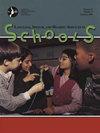克罗埃西亚语发展性语言障碍儿童的个人叙事:在语言、命题和宏观结构层面调查情绪效价的影响。
IF 2.9
3区 医学
Q1 AUDIOLOGY & SPEECH-LANGUAGE PATHOLOGY
Language Speech and Hearing Services in Schools
Pub Date : 2025-05-05
DOI:10.1044/2025_lshss-24-00111
引用次数: 0
摘要
目的:虽然我们知道患有发展性语言障碍(DLD)的儿童在撰写个人叙事方面存在困难,但之前的研究并没有采用广泛的测量方法来反映不同层次的话语处理功能,如失语症叙事的语言基础(LUNA)框架所提出的那样。由于儿童通过个人叙述唤起愉快或不愉快的事件,本研究探讨了事件的情感效价是否会影响讲克罗地亚语的DLD儿童和具有典型语言发展(TLD)的儿童在语言、命题和宏观结构层面的叙述产生。方法50名10岁讲克罗地亚语的DLD儿童和50名性别匹配的TLD儿童使用全球故事协议,通过基于情感的提示讲述个人故事。通过将每个叙述事件编码为愉快(积极)或不愉快(消极)来分析情绪效价。通过语言(词汇多样性、语法复杂性和准确性)、命题(迷宫、不完整的话语、局部连贯)和宏观结构(整体连贯)水平对叙事进行评估。结果:我们的研究结果表明,说克罗地亚语的DLD儿童在话语生成的所有三个层面上都难以形成个人叙事,这体现在语法复杂性和准确性较低、话语不完整、局部和整体连贯性较低。这些困难在积极和消极的叙述中都是一致的。结果还显示,在两组儿童中,消极叙述的时间顺序比积极叙述的时间顺序更好。结论:这些研究结果进一步证明,无论他们叙述的事件的情感价值如何,DLD儿童在跨LUNA框架的不同层面上,在语言组织良好、完整和连贯的个人叙述方面存在相当大的困难。补充MATERIALhttps: / / doi.org/10.23641/asha.28819385。本文章由计算机程序翻译,如有差异,请以英文原文为准。
The Personal Narratives of Croatian-Speaking Children With Developmental Language Disorder: Investigating the Influence of Emotional Valence at Linguistic, Propositional, and Macrostructure Levels.
PURPOSE
Although it is known that children with developmental language disorder (DLD) have difficulty composing personal narratives, previous studies have not employed a wide range of measures that reflect functioning at the different levels of discourse processing, as proposed in the Linguistic Underpinnings of Narrative in Aphasia (LUNA) framework. Because children evoke pleasant or unpleasant events through personal narratives, this study examines whether the emotional valence of the event influences the narrative production of Croatian-speaking children with DLD and those with typical language development (TLD) at the linguistic, propositional, and macrostructure levels.
METHOD
Fifty 10-year-old Croatian-speaking children with DLD and 50 gender-matched peers with TLD told personal narratives elicited through emotion-based prompts using the Global TALES protocol. Emotional valence was analyzed by coding each narrative event as either pleasant (positive) or unpleasant (negative). The narratives were evaluated using measures from the linguistic (lexical diversity, grammatical complexity, and accuracy), propositional (mazes, incomplete utterances, local coherence) and macrostructure (global coherence) levels.
RESULTS
Our results show that children with DLD who speak Croatian have difficulty forming personal narratives at all three levels of discourse production, as evidenced by lower grammatical complexity and accuracy, more incomplete utterances, and lower local and global coherence. These difficulties are consistent in both positive and negative narratives. Results also showed that negative narratives are chronologically better ordered than positive narratives in both groups of children.
CONCLUSION
These findings provide further evidence that children with DLD have considerable difficulty producing linguistically well-organized, complete, and coherent personal narratives across different levels of the LUNA framework, regardless of the emotional valence of the events they recount.
SUPPLEMENTAL MATERIAL
https://doi.org/10.23641/asha.28819385.
求助全文
通过发布文献求助,成功后即可免费获取论文全文。
去求助
来源期刊

Language Speech and Hearing Services in Schools
Social Sciences-Linguistics and Language
CiteScore
4.40
自引率
12.50%
发文量
165
期刊介绍:
Mission: LSHSS publishes peer-reviewed research and other scholarly articles pertaining to the practice of audiology and speech-language pathology in the schools, focusing on children and adolescents. The journal is an international outlet for clinical research and is designed to promote development and analysis of approaches concerning the delivery of services to the school-aged population. LSHSS seeks to advance evidence-based practice by disseminating the results of new studies as well as providing a forum for critical reviews and meta-analyses of previously published work.
Scope: The broad field of audiology and speech-language pathology as practiced in schools, including aural rehabilitation; augmentative and alternative communication; childhood apraxia of speech; classroom acoustics; cognitive impairment; craniofacial disorders; fluency disorders; hearing-assistive technology; language disorders; literacy disorders including reading, writing, and spelling; motor speech disorders; speech sound disorders; swallowing, dysphagia, and feeding disorders; voice disorders.
 求助内容:
求助内容: 应助结果提醒方式:
应助结果提醒方式:


